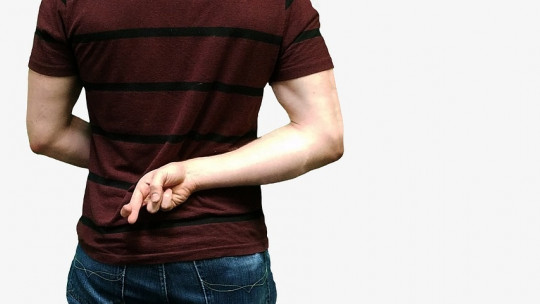
Although it is difficult for us to admit it, we have all lied at some point. In fact, we lie more than we believe At least that is what the data from an investigation that was published in “Liespotting: Proven Techniques to Detect Deception” seems to indicate, an editorial work by author Pamela Meyer.
The researchers of this study conclude that human beings we tell lies between 10 and 200 times a day, because we tend to omit parts of the truth or exaggerate things when we talk to other people. In other words, we tend to say things that are socially acceptable. If what we have to say we believe is not well received by the other party, we add some fallacy or another to the conversation.
Lying is common when we meet someone new
Now, the results of research regarding lying provide more data. In fact, we tend to lie more when we have just met a person “We tell two or three lies during the first 10 minutes of the first conversation with someone we just met,” says Robert Feldman, professor of psychology at the University of Massachusetts and author of the book The liar in your life.
But despite telling quite a few lies, When it comes to detecting them when someone tells us them, we are not very good According to a study by Brigham Young University in the United States, when someone lies to us, we only realize it between 54% and 56% of the time.
How to catch a liar
Discovering a liar is complicated, and it can be challenging to know if someone is lying to you. Even if you detect that there may be something strange in someone’s words, when you are not sure if they are being honest or not, hundreds of thoughts go through your mind. There is always that doubt or possibility that you are wrong in your suspicions.
Fortunately, thanks to the people who have cared to investigate this phenomenon, today we know that there are some factors that can reveal those people who lie; a knowledge that is very useful especially in Forensic Psychology. These keys to detect lies are the following:
1. Non-verbal language
Obviously, we must pay attention to the context before we can say whether the person is lying or not, although there are a number of non-verbal cues that could indicate that a person is lying. Therefore, if you are suspicious of what someone tells you, you can pay more attention to gestures instead of words
Liars tend to keep their hands hidden. That is, they put their hands together, hold them behind their back, or put them in their pocket. They also find it difficult to sit upright and have a rather tense posture. Some experts also say that covering the mouth or scratching the nose could indicate that the person is hiding something, since it is a way not to reveal microexpressions
The gaze seems to be key to detecting lies because if the liar has to think something, he can move his eyes slightly up or to the left (right-handed) or right (left-handed). If you look directly into their eyes, They tend to avoid eye contact
2. Breathing
Breathing could indicate that a person is lying. Their way of breathing is usually faster and the mouth is usually dry, since the person is in a rather tense situation, and wants to avoid being caught at all costs. This can cause you to swallow constantly. In reality, this occurs because his heart beats faster and his lungs require more air than in a calm situation.
3. How he speaks
Since the person is lying and their breathing is affected, his way of speaking is also different Experts say you either speak faster or speak slower than normal. Likewise, when a person tells a lie, his voice may become higher pitched, as the tension causes the vocal cords to be tense. If you put the liar on the spot, he or she is more likely to stutter.
4. What does it say
When we lie, we feel more vulnerable and uncomfortable (unless we are psychopaths), and even though the person is an experienced liar, they are not going to want to be caught. This makes me try to change the subject quickly to prevent the lie from getting out of hand. Furthermore, it is less likely that the liar uses the words “I” and “mine” in an attempt to psychologically distance himself from the false stories about him.
5. Connection between what you say and what you do
Instead of looking at behaviors separately, it is more important to make a general assessment of everything that surrounds the situation. When a person is honest, what she says and what he does become synchronized and form a coherent whole. Not only that, but they also synchronize with said situation.
If you know the person who is lying, it may be easier to detect their fallacy, as experts believe you can see if there is a change from their usual behavior. and if there is little coherence between what is said and what is done (as the Simpsons series hilariously showed us). Furthermore, when someone simulates an emotion, it can only be seen around the mouth. For example, for the emotion of joy, only move your mouth, instead of moving your jaw, forehead, and eyes.
6. Sweat
Lying causes even experienced liars to feel some degree of stress or pressure. AND When we lie, even if it is a minor lie, we sweat more This occurs because sweating is a natural response to stress. So, sweating is quite common when telling a lie and a sign to detect a liar.
7. On the defensive
Liars smile less because they are in a tense situation, but if you test them, they usually they become extremely defensive If you ask them a question, they may avoid it and even refuse to answer, and if you get them to answer they will do so with a phrase like “Why do you want to know that?” or “That’s not important right now.” This will happen because he is surely on the ropes.
How to detect a liar on WhatsApp
If face to face it is already difficult to detect a liar, it is even worse when the person is talking to you on WhatsApp. In this situation, you can’t observe his nonverbal language, hear his tone of voice, know if he is sweating… and you also can’t know if what he says and does are consistent.
Now, research seems to have found the key to detecting liars in a conversation through this application.








